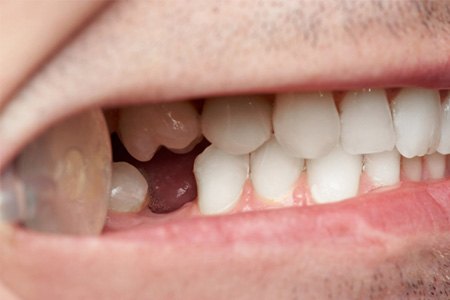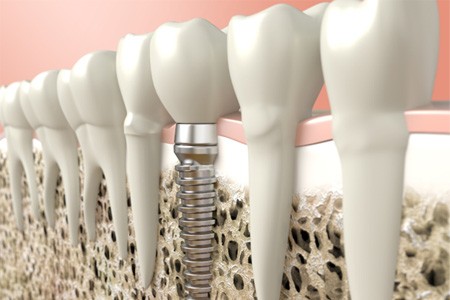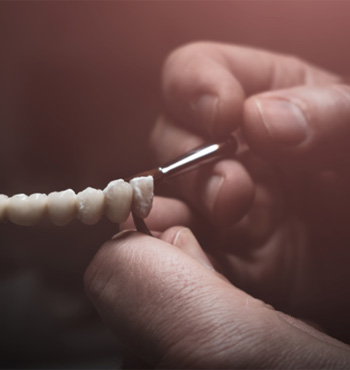Dentures – Fort Worth, TX
Restore Your Grin with New Teeth

If you’ve lost any of your teeth, you know firsthand that it’s challenging. Not only do you suffer from an unsightly smile, but you also face various health problems. As such, tooth loss can drastically lower your quality of life. That said, there is a solution for this problem: dentures in Milwaukee! With help from Milwaukee Dental Implants, such restorations could (and would) return your full grin. To learn more about them and their features, just keep reading or book a visit with our office.
Who's a Good Candidate for Dentures?

Dentures are ideal for people who have experienced significant tooth loss. Depending on how many teeth you are missing and where they are located in your mouth, we can put together a customized treatment plan just for you! The majority of adults make good candidates for dentures. Read on to learn more about the effects of missing teeth and the qualifications you must meet to get them.
Effects of Missing Teeth

Many different factors can lead to tooth loss. The most common include tooth decay, gum disease, and injury. According to the American Academy of Periodontology, missing teeth have several consequences, like facial sagging, difficulty speaking, trouble eating, and low self-esteem. The good news is that dentures are about to positively impact all of these areas, therefore improving the quality of your life.
What Qualifies You for Dentures?

Most adults can get dentures without much of a problem. They are great for those who are missing several, most of, or all of their teeth. However, denture-wearers must maintain healthy gum tissue and have sufficient jawbone. When you are missing teeth for a long time, the jawbone starts to deteriorate, resulting in bone loss. If you currently have dental issues, like gum disease or tooth decay, these will need to be eliminated before you can start wearing dentures.
The number of teeth you are missing ultimately determines which type of denture is ideal for you. One of the benefits of dentures is the fact that they are more affordable than other tooth replacement options, like dental implants. This makes them ideal for those who are unable to invest much money into their smile at this time.
Alternative Tooth-Replacement Options

If you aren’t a good candidate for dentures, or they aren’t something that you are interested in, you may want to consider other tooth replacement options that we offer.
- Dental Bridges: A dental bridge “bridges” the gap in your smile. This method works for patients who are only missing one or a few consecutive teeth. A dental bridge requires that the patient has healthy adjacent teeth surrounding the empty space to support it.
- Dental Implants: A dental implant is a titanium, screw-like post that is surgically inserted into the jawbone. Patients must have a solid bone structure and be able to undergo a minor surgical procedure. Dental implants have a higher upfront cost, but they last for many decades or even the rest of your life!
Types of Dentures

When you consult with Dr. Franzen, he’ll get a chance to learn your smile goals, medical history, oral health, and more. From there, he can recommend custom dentures that best meet your needs. More specifically, he’ll suggest one of three possible types. They are the following:
Partial Dentures
Partial dentures only replace a few pearly whites. As such, they work by clasping onto the chompers on either side of your smile gap.
Partials usually have a gum-colored acrylic base and artificial acrylic (or porcelain) teeth. However, sometimes they include metal components as well.
Full Dentures
Per their name, full dentures “fully” replace all the teeth along an arch. Consequently, they secure themselves through natural suction instead of clasps.
In general, full dentures use the same materials as partial ones. A unique difference, though, is that their bases are custom-fitted to fit comfortably over the gums.
Implant Dentures
Implant dentures are a permanent type that relies on dental implants. For that reason, they’re a great alternative for patients who want a more permanent, unwavering option.
Due to using dental implants, these dentures have special perks. Firstly, they don’t slip or fall. Another advantage is that they can prevent jawbone loss.
How Dentures Are Made?

Dentures today aren’t like the ones that your grandparents used to have. They are entirely customized for each patient. This allows for additional comfort and a natural appearance that makes you feel confident when showing off your smile! To achieve this, getting dentures requires a multistep process. Everyone’s treatment looks a little bit different, but here’s what you can generally expect.
What Are Dentures Made Of?

Dentures are made up of two different parts: the base and the replacement teeth. Here is what each of them looks like:
- Base: The base is the foundational structure of the replacement teeth. It can be made from many different materials, like acrylic, nylon, porcelain, resin, and metal. Acrylic tends to be the most common material because it is easily tailored to match your gum tissue, leaving you with a natural appearance.
- Teeth: The replacement teeth are generally made from resin or porcelain because they look very similar to natural tooth enamel, even in the way that they reflect light. Porcelain is a more popular option for full dentures because it is more durable.
The Denture Creation Process

Dentures are customized for each person. This takes several steps to achieve. Everyone’s plan can vary, but here are the main steps to expect:
- First, your dentist will take measurements of your jaw and impressions of your upper and lower gums. This is used to make a plaster model of the mouth. It is used to ensure that your final denture fits perfectly.
- The model is sent to the dental laboratory. This is where your dentures are made. First, your replacement teeth are set into place using a mechanical device known as an “articulator.” Adjustments are then made by a lab technician.
- The wax dentures are sent back to your dentist for a fitting. If everything looks good, they are returned to the dental laboratory to complete the process.
- Once your dentures are returned to the lab, the wax is replaced with acrylic. To do this, the lab technician placed the dentures into a flask. Plaster is poured into the flask to maintain the shape of the dentures. Then, the whole flask is placed in hot water to melt away the wax.
- The plaster is cut away from the dentures using dental tools. Then, the dentures are placed into an ultrasonic bath to wash away the rest of the plaster.
- Excess acrylic is cut from the dentures. Then, the dentures are polished to perfection.
- Now that your dentures are ready, you can return to the dental office to try them on.
- If you and your dentist are both happy with the results, you can leave the practice showing off a complete grin!
Adjusting to Your New Dentures

When you first get your dentures, you may experience some soreness, but this isn’t something to worry about. Temporary discomfort is common as one adjusts to their new prosthetic. Your dentures will soon start to feel more and more natural. During this adjustment period, it is best to stick to softer, easy-to-eat foods and exercise your facial muscles. If discomfort persists or you have concerns, don’t hesitate to contact us so we can help!
The Benefits of Dentures

Missing several or all of your teeth can take a toll on both your oral health and your self-esteem. By replacing them with incredibly lifelike dentures, you can be sure to enjoy many of your everyday oral habits again, such as eating, talking, and smiling. Over time, your prosthetics will feel as though you’ve regained your complete grin. Dentures come with a wide variety of benefits, and here are some of the most prominent ones you can expect after your treatment.
Psychological Benefits

Those who suffer from tooth loss often experience both oral and psychological downsides. Having one or multiple gaps in your smile can make you feel uncomfortable showing your grin, and you might steer clear of most social interactions or activities to avoid embarrassment. With a full smile from dentures, you won’t feel as anxious around friends or family. The result is greater self-confidence and body image, as well as a reduction in anxieties about speech, chewing, appearance, and more.
Clearer Enunciation

It can be incredibly difficult to pronounce certain words or sounds without some of your teeth present. This is because humans typically press their tongues and lips against their pearly whites to enunciate clearly and effectively. By wearing custom-made dentures, you can end up regaining your ability to speak clearly, improving your communication. This usually involves an adjustment period, but it’s only temporary and can be much smoother with time and practice.
Improves Nutrition

Some foods, while nutritious, can be tougher to bite into, such as certain fruits, vegetables, and lean meats. Being unable to properly chew your meals can lead to complications like indigestion and malnutrition. By providing new teeth, dentures improve your ability to chew food. They thus allow you to eat a more nutritious, wider-ranging diet, which can end up helping to promote better oral and overall health.
Preserves Oral Health

Those who still have some of their natural pearly whites remaining can greatly benefit from wearing dentures. These prosthetics can help keep existing teeth from moving out of position, as this is normal after tooth loss. Additionally, dentures help distribute the pressure of chewing more evenly throughout your bite, effectively reducing the wear and tear of your tooth enamel.
Expands Opportunities

Most people will first notice your smile above all other things. This makes your teeth incredibly important when making impressions, either during a first date or a job interview. By getting dentures, you can not only complete your grin but also feel confident about the way you look, which can translate into the way you carry yourself. Others may then perceive your confidence as outgoing and attractive, which can boost your chances of success in your social and professional life!
Understanding the Cost of Dentures

There are many factors that go into the cost of your new dentures, including the materials used, the type of denture, and any preparation work required before you get them. Prosthetics such as dentures are often partially covered by dental insurance.
Factors that Affect the Cost of Dentures

There are three major factors that influence the cost of your new dentures. These include:
- The preparation of your mouth prior to getting your prosthetics, such as tooth extractions, gum disease therapy, or bone grafting.
- The type of materials used to make your dentures, such as an acrylic base, etc.
- The type of replacement teeth used, such as porcelain or acrylic.
Be aware that just because a denture is cheap doesn't mean it’s a good deal. For some “bargain” dentures, they may use lower quality materials that are more likely to break with regular use.
Are Implant Dentures More Expensive?

Yes, implant dentures are more expensive than traditional dentures, however this is for good reason. Implant dentures are much more permanent and do not need to be replaced frequently like traditional dentures do. Not only do they last longer, but they are also more lifelike, and because they are secured via dental implants, they allow for better stability when speaking and chewing.
Does Dental Insurance Cover Dentures?

Yes, because dentures are considered a major procedure, your dental insurance may cover around 50 percent of their cost. If you are interested in learning more about exactly what your policy will cover, our office team will be happy to help you confirm your coverage before the start of your treatment.
To learn more about your options, please schedule a consultation with Drennan Family Dentistry today.
Denture FAQs
How Long Will You Have to Wait to Get Dentures After Your Teeth are Pulled?
Generally speaking, patients will wait until the gums have healed after a tooth extraction and any swelling has gone down, affording the dentures a better fit from the start. This often takes anywhere from six to eight weeks, but the exact amount of time will vary.
However, in some situations, patients get something called an “immediate denture.” This means that you’ll be able to get your new smile sooner after your teeth have been removed, but also means that the shape of your gums and bone might change as you heal. In such situations, you’ll likely need several relines at the beginning of your time with dentures.
Do Dentures Break Easily?
Dentures are made from a durable acrylic and are designed to be as durable as possible. They are capable of standing up to daily wear and tear for years at a time, generally somewhere between five and seven before needing to be replaced.
However, accidents happen. If you drop your dentures from a high height onto an exceedingly hard surface, it is possible for the prosthetic to be damaged. It’s also possible for small cracks to develop and get larger over time. For this reason, it’s a good idea to visit us often for checkups so that we can check the integrity of your prosthetic.
Can Dentures Become Ill-Fitting?
When you first get your dentures, they will have been specially molded to fit your gums. That being the case, they should fit perfectly.
However, it’s fairly common for the fit of your dentures to change over time. Most patients experience jaw shrinkage due to their tooth loss, and wear or tear can cause the prosthetic to come loose.
This can cause all kinds of oral health problems if it’s not addressed—you might experience a greater number of denture sores or have trouble speaking with ease. In this situation, it’s a good idea to talk to us about relining your dentures.
Can I Sleep with My Dentures?
When you first get your dentures, you might be told to keep your prosthetic on for 24 hours. However, this is the only time you should wear your dentures while you sleep.
In nearly every other circumstance, it’s a good idea to take out your prosthetic before you go to bed. This gives your gums time to rest, and allows you to soak your dentures and an antibacterial solution overnight to ensure that they’re free from plaque buildup.
If you make a habit of wearing your dentures to bed, you’ll likely experience an increase in denture sores, a bad smell to your prosthetic, and overall worse dental hygiene.






